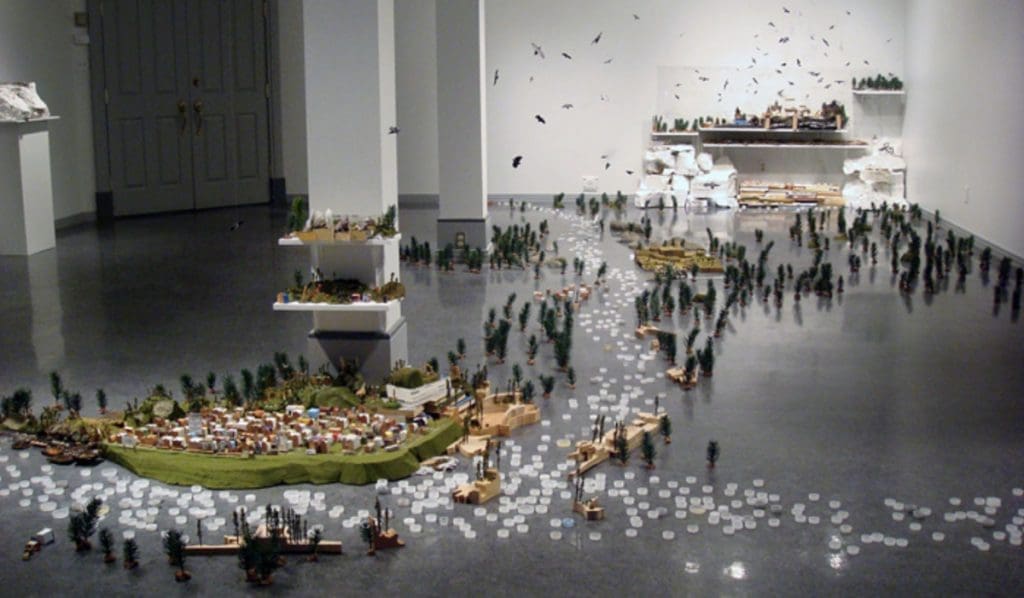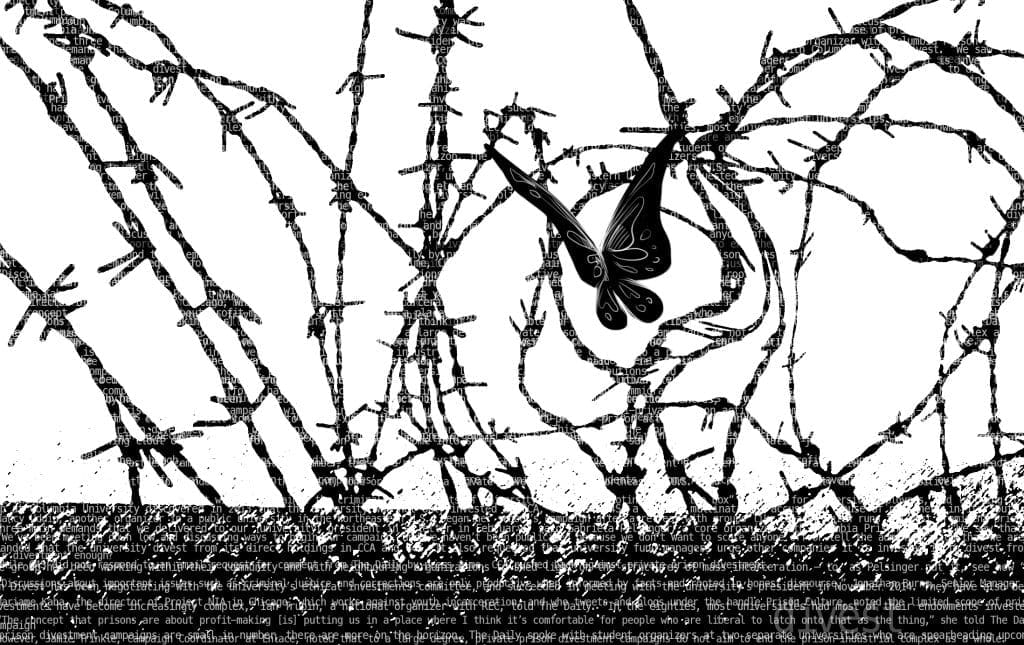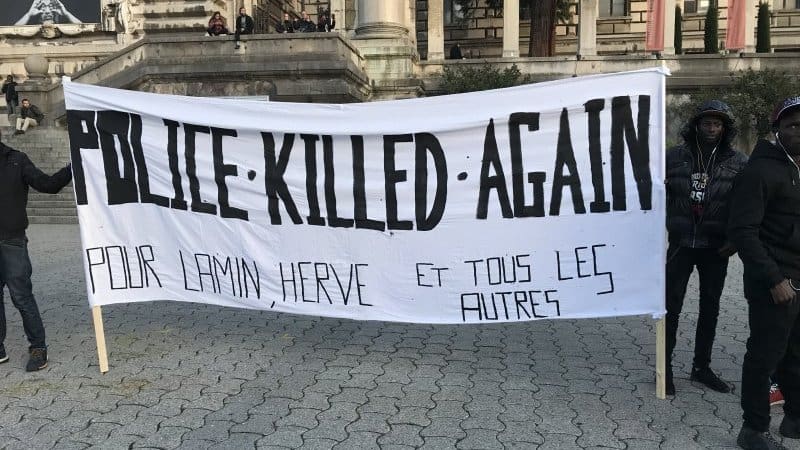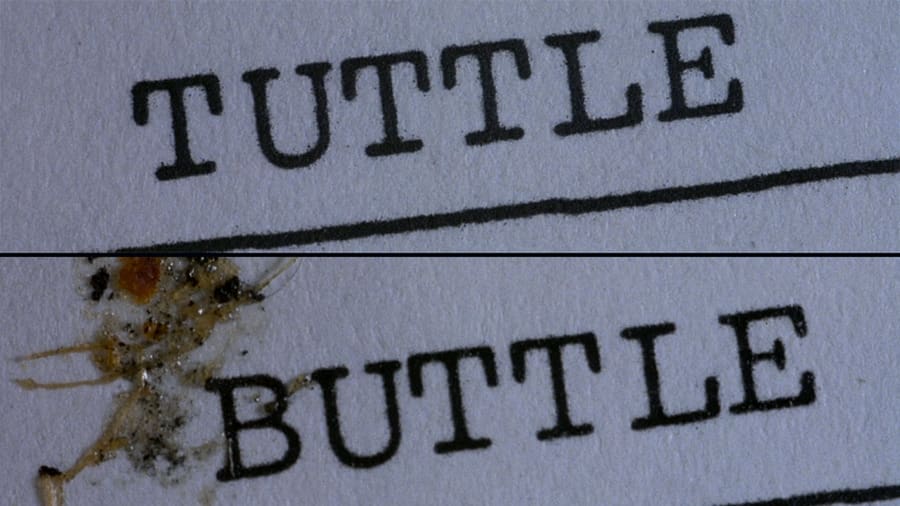Transcribed from the 14 December 2021 episode of This is Hell! Radio (Chicago) and printed with permission. Edited for space and readability. Listen to the whole interview:
Historically, “Western” science was really important for figuring out how to take other people’s land. How do you move into tropical or arctic areas without dying, as a white settler? How do you not get malaria? How do you cure malaria? How do you cultivate certain foods so you can eat what you’re used to eating in your lands?
Chuck Mertz: If you want to get a scientist angry with you, tell them science is colonialism. I know: I’ve done it and it does not go over well. The very idea of the study of our physical world being grounded in settler colonialism and displacing Indigenous populations while erasing Indigenous knowledge would seem anathema to science. But as today’s guest convincingly argues, whether scientists realize it or not, science has played an outsized role in colonialism.
Here to help us understand the connections between science and colonialism, doctor Max Liboiron wrote the Nature article “Decolonizing Geoscience Requires More Than Equity and Inclusion.”
Welcome to This is Hell!, Max.
Max Liboiron: Thank you.
CM: The very first sentence of your article would get me in trouble if I mentioned it to some friends of mine. That is, “Science has long played an integral role in colonialism.” That sentence can be very upsetting to those who have dedicated their lives to science. If science was integral to colonialism, to what extent can scientists find solace in at least believing science’s role in colonialism is something that happened in the past—that today’s science is not contributing to colonialism to the same degree?
ML: Most dominant knowledge systems like science contribute to other dominant systems like capitalism and colonialism. That doesn’t mean it’s inherently bad, but it does mean it’s aligned with certain ways of thinking about power. Historically, “Western” science—which means science that grew out of ancient Greece, and was influenced heavily by Christianity and Judaism and Islam, about how to sort out your feelings and your thoughts and your spirit and your body, going through the Enlightenment—was really important for figuring out how to take other people’s land. How do you move into tropical or arctic areas without dying, as a white settler? How do you not get malaria? How do you cure malaria? How do you cultivate certain foods so you can eat what you’re used to eating in your lands?
At the same time, the idea of bringing that type of knowledge system over and replacing local knowledge systems with Western science was seen as the hallmark of civilization. Getting rid of what might be called superstitions—just other forms of systematic knowledge—so that Western science could prevail was the winning of the land. Ironically, at the same time, without local knowledge, Western scientists and settlers would have died immediately; they needed to turn a lot of local knowledge toward colonial goals just to survive, and then take over.
CM: The religious impact on science is not something that is regularly recognized by scientists. When we talk about Indigenous knowledge, it’s always framed within the religious or spiritual nature of it. Is science Christian colonialism? And is it fair to consider that Indigenous knowledge is influenced by spirituality, while Western knowledge is not?
ML: Western science is very influenced by spirituality, including the disavowal of that. The idea that you can split off your feelings from your thoughts, or your body from your brain, or your intentions from your actions—that’s very Christian. Your soul leaves your body and goes somewhere else. That kind of splitting is very unique to Western cultures and Western science. Of course it gets expressed in very different ways if you follow it down the line. But that’s what “objectivity” is: the soul/body or mind/feelings split. Other knowledge systems find that kind of cheeky. If you keep doing that, which you can’t really do, you’re going to be really biased and you’re going to go down some roads that don’t lead you to good places. And that is what happens.
CM: How aware do you think the Western scientific community is of their historic contribution to colonialism?
ML: It’s really uneven, but increasing? I think middle-aged and younger scientists—and some older folks too—are starting to notice that there aren’t a lot of Black or Indigenous or folks of color in science, or trans folks, or women. That’s not because science is for white people, it’s because something is happening to those folks that isn’t outside of science. It’s integral not just to the profession but the culture of science, and how science is done, and where it is done and where it is not done. People are becoming aware of that.
This is why Nature invited me to write this piece, to talk about this problem in terms of colonialism. If you’re an Indigenous person and you go and do your science degree, you will be repeatedly told that local knowledge has no bearing, that elders aren’t scientists, that ethics-over-content is bull. This constant wrongness, from an Indigenous community perspective, is not only normal but right, and the only right. So of course you leave and go somewhere where other ways of thinking are more accepted.
CM: You write, “Since the European Enlightenment, research on tropical and arctic climates, diseases like malaria, and on soils and the cultivation of plants, among other topics, was required to prepare ‘new’ lands for settlers and settlers for those lands.” How focused was science on making certain settlers would be safe when they colonize and occupy foreign lands? Was colonialism the driving force of scientific inquiry? Or was scientific inquiry the driving force behind colonialism?
ML: I think they were best friends. Public medicine used to be called “tropical” medicine. It used to be about not dying of malaria. Entire fields and approaches are dedicated to making sure that settlers don’t die when they go to these places, because they don’t know what they’re up to. There are entire areas of science about colonizing Mars—that’s just an extrapolation of what’s already happened on Earth. A ton of botany is about taking and patenting and learning all about seeds so you can extract value from these places in India and North America and South America.
Science was needed to do that. And science loved doing that. And now they’re best friends. We forget about really common inventions in science, it seems: the “acre” was about privatizing land, and that gets into measurements—it’s really tightly interwoven. So the question isn’t whether science is a big jerk: the question is, given this legacy, what do we do? We’re not going to unring these bells. But we can recognize that these bells are ringing and try and play a different tune. What would that look like? This is our legacy as scientists. Pretending it doesn’t exist won’t help. Given that, what do we get up to?
Colonialism is a means of non-Indigenous access to life and land and culture and thought, for the enrichment and use and benefit of non-Indigenous folks. Using Indigenous ideas in your classroom to enrich the white folks is still colonialism. That’s still how local knowledge is treated in a colonial relationship.
CM: You point out that at the same time, “science was considered a gift that imperial powers brought to colonies, part of what was seen as a civilizing mission. The replacement of local forms of knowledge was considered a mark of success.”
Science replaced local forms of knowledge. How unscientific were local forms of knowledge?
ML: In some cases it’s a question of semantics. But if we think about small-s science as systematic inquiry that holds when it gets tested in the world over and over again, then children are scientists. They learn about the world, they test things. They’re like, “Ope, that’s how gravity works!” They learn how to walk. They are systematically testing things, learning the rules, and then it holds up in the world.
The miasma theory of disease, where various folks (including Europeans) thought that disease came from bad smells, is the longest scientific theory of pollution in the history of disease and pollution. Because it held up really well. When you drain swamps and the smell went away, yeah, people were healthier. When you didn’t let things go rotten and then drink them, you didn’t get sick! Any time there was systematic knowledge acquisition that holds up in the world, that’s systematic inquiry, that’s science.
CM: Has science to any degree stopped contributing to colonialism? Or, like colonialism, is it in a different form, far more subtle than more brutal and obvious incarnations of colonialism, where people were even proud and boastful of their colonial power?
ML: That’s a good and difficult question. When a system becomes dominant it also becomes unremarkable. It gets hard to point to. It’s like racism. If someone calls someone else the n-word, everyone can point that and say, “Yep, that’s bad, we can see that, we can point to it, we can all agree, on a spectrum, that that was racism.” But it’s much harder to point to microaggressions and the magical way that Black people just aren’t in science and technology fields.
Science and colonialism have the same relationship. Sometimes, yes, scientists go into Indigenous communities and act like, “You’re dumb and superstitious and Western science is here to save you.” That still happens, and that is very overtly colonial. But dominant systems start to dictate what is common sense, normal, natural, and unexceptional. The idea that you can just pick up a rock, as a geologist on a walk, and take it back with you to show your class seems inherently good and kind, and pedagogical and good for teaching. But if that was Indigenous land, that’s actually theft—and probably breaks treaty relations and land claim agreements. That’s colonialism.
And the idea that including more Indigenous “voices” in your teaching is the opposite of colonialism is actually still colonial. Colonialism is a means of non-Indigenous access to life and land and culture and thought, for the enrichment and use and benefit of non-Indigenous folks. Using Indigenous ideas in your classroom to enrich the white folks is still colonialism. That’s still how local knowledge is treated in a colonial relationship.
The point of the article is breaking down the conflation of different types of good. Anti-racism is good, and decolonization is good, and inclusion is good, and taking your shoes off at the front door is good. But if you start saying taking your shoes off at the front door is the same as decolonization, now we have a problem. Land relations haven’t changed if you take your shoes off at the front door.
Including more Indigenous people in STEM, where it is quite crappy for us because of these forms of colonialism and racism that are still going on; diversifying who shows up to a panel even though they may still be saying local knowledge is stupid and superstitious or isn’t systematic or worthy—it doesn’t matter what color those folks are. That’s still colonialism.
CM: You pointed out that dominant systems stay dominant in part because they dictate what counts as common sense. How difficult is it to challenge what is considered normal and natural? Is that the biggest challenge when it comes to decolonizing science?
ML: Totally. I work in a lab where these are some of the basics of how we organize our science. We don’t assume access to Indigenous land for non-Indigenous folks. I had one student who was in my lab for maybe four years—one of the main things we studied was plastic pollution—and she was like, “There’s been a big bird die-off in this area. Can I go get the birds so we can open them up and look for plastics?” And I said no, you’re going to need permission from the Indigenous group to do that. And she said, “But they’re dead!” Still on Indigenous land. And she’d been working with me for years. But something just clicked in her head: well they’re worthless, they’re not useful to the Indigenous group, they’re not going to be eaten, therefore I get unfettered access. No, under no conditions do you get unfettered access.
It’s super hard. I catch myself doing colonial things all the time, reproducing it. It’s how I was trained. For instance, one of the ways you can analyze plastics in something like a shellfish—you can’t really open up a shellfish’s belly and look for very small plastics with your eyeballs on a tweezer. The scientific method for doing that is dissolving the poor guy’s little body, and all the plastics float to the top. First of all, that’s kind of rude to the mussel. Not a great land relation. But second of all, then you’ve got this toxic sludge and you’re going to need access to Indigenous land to put that toxic sludge there to “take care of it,” to assimilate it, to store it. That’s a colonial land relation.
Making knowledge in a way that harms Indigenous land for the “greater good” is a colonial land relation. We used that method in my lab for a year before I thought: wait a minute, where are those jars going? Oh. Dang. And then we had to change our protocol. So it’s very tricky.
CM: You write, “The current mechanisms of colonialism might look different, but non-Indigenous entitlement to Indigenous land, life, and knowledge still characterizes everyday relations in science.”
Is it one or the other? Must we choose between colonial science and Indigenous knowledge? Can they work collaboratively?
ML: Totally. First of all, friend, you can’t have Indigenous knowledge unless you’re Indigenous. It comes out of cosmologies and communities. It’s like, “I’m gonna take Black knowledge today.” That’s cheeky (I’m not Black). And wrong! It’s the same problem with a new dress on.
I often talk about anti-colonial science as opposed to decolonial science. I can talk about that more in a minute. But anti-colonial science just means science that ain’t colonial. How about if you just don’t assume entitlement to Indigenous land and life as part of your research? I’m not going to just walk onto that land and take stuff. That’s the anti-colonial research design move. Or if you talk to Indigenous folks to try and understand something, pay them as consultants the way you do everyone else, instead of being like, “Oh, that’s just cultural. We’ll just take that, it’s not worth anything.”
Indigenous science, knowledge systems, and ways of doing are very tied to balance and generosity and not doing large-scale interventions that would change those balances. Our science takes scale into account, takes relationships into account, takes obligations to land into account. Your average Western science doesn’t do that.
There are different moves you can make that don’t reproduce this entitlement. What’s really important to understand is just because you’re not a jerk, that’s not the anti-colonial move. The example I use all the time is beach cleanup. I work in the plastic world, and cleaning up shorelines for plastics is very common and environmental and good for plastic pollution. But it can still be colonial if you just access that beach and do what you want with it because you want it to be healthy on your terms. It can be environmental and colonial at the same time. One form of good isn’t good for everybody and everything. Some forms of good can still be colonial.
Another big example is hydro-electric dams to deal with climate change. There’s a hydro-electric dam in my province of Newfoundland and Labrador that is putting methyl mercury into the water, because that’s what dams do, and it is poisoning the food chains of mostly Inuit folks who rely on that water for a huge portion of their food. And, by the way, they said No at the beginning of this. So there’s an environmental project—also very colonial.
CM: What is the difference between anti-colonial and decolonial science?
ML: I rely a lot on the work of these two very smart people called Eve Tuck and Wayne Yang. In the North American context, they say if colonization is access to Indigenous land, then decolonization is Land Back. Straight up. Full stop. Period. Anti-colonialism means not reproducing colonialism, while decolonization means Land Back.
There are of course different colonialisms in different parts of the world that will have different decolonizations and different meanings. But Land Back is a huge and central part of that. Including Indigenous authors in your syllabus, and teaching or reading more books by Indigenous folks is not decolonization, it is not Land Back. If you leverage it and stop reproducing the entitlement problem, then it might be anti-colonial. That’s why I differentiate: because they are different goods, and they address different bads.
CM: Science of course would argue that Western ways of knowing and doing are superior. Is there any evidence that science is not superior to Indigenous local knowledge?
ML: Climate change, deforestation, ocean acidification, acid rain, plastic pollution, forest fires, landslides—want me to keep going? Indigenous science (if you can call it that; not all Indigenous people want to call it “science” because science has this baggage, and using “Indigenous” as a catch-all is kind of rude because there are a bazillion different Indigenous groups), knowledge systems, and ways of doing are very tied to balance and generosity and not doing massive, large-scale interventions that would change those balances. Our science takes scale into account, takes relationships into account, takes obligations to land into account. Your average Western science doesn’t do that.
There are a number of examples where thousands and thousands of years of Indigenous science had far better outcomes than a hundred years of Western science in the same places.
CM: What impact has colonialism and science had on local knowledge? How much damage has colonialism done to that knowledge?
ML: It’s done a lot of damage. I saw one guy Kyle Whyte, he’s Potawatomi, explain that if knowledge is a set of interlocking rings that form a giant ring, if it’s this big ring of rings, and colonialism comes in with a giant hammer and first it kills your knowledge holders, and then it kills your governing bodies, and then it kills women who are major knowledge holders, and then it brings in residential schools to de-inculture everyone, you’re going to be missing some rings. That is the point of genocide, and colonialism is a genocidal project. Yeah, it had effects. It was unevenly successful in different ways.
I live in a place in Newfoundland where the local folks were the Beothuk. I don’t even know how to say “Beothuk” because the genocide was so complete that there are no knowledge holders left of any kind. There might be little tweaks of DNA here and there. But there is no Beothuk practicing culture or knowledge or anything. So yeah, of course it’s damaged. Does that mean it doesn’t work? No. You can drive on a flat tire and get very far, and you can learn to inflate that tire.
There are things you know and there are ways you know. A lot of the ways we know are still intact. You can fill that content back in with your ways of knowing. When elders tell us about how to go onto the land and observe and listen—scientific methods, maybe you’d call them, maybe you wouldn’t—these are methodologies of knowledge. The way that your body is attuned to the land as a way to listen and learn and think—you can get your content back. A lot of it. And you can adapt it. Indigenous knowledges were never static. They can adapt to when it’s also covered in concrete, and when the ocean is acidic, and when climate is swinging. Our knowledge can handle all of that. It is not defunct. It’s just been beaten to a pulp. But you can do a lot with pulp.
CM: You write, “We must be specific. Colonialism is about access to Indigenous land and the replacement of Indigenous ways of knowing and living. The opposite of colonialism is not inclusion.”
Discussing Indigenous residential schools, Martin Billheimer, author of Mother Chicago: Truant Dreams and Spectres Over the Guilded Age, explained on our show how progressives in the late nineteenth and early twentieth century viewed those schools as a site of “inclusion,” by “including” Indigenous people within the Western education system. Martin even quoted president Ronald Reagan lamenting that so much harm had been done to Indigenous culture and Indigenous peoples, and his belief that it was “unfortunate” that settlers were not more “inclusive” when it came to Indigenous culture.
You argue the opposite: Inclusion is colonialism. What does it reveal, either about colonialism or its adherents, who see inclusion as the opposite of colonialism?
ML: One of the hallmarks of imperialism, which is best friends with colonialism, is the idea of making mini-me’s: mini-Europes, mini-Europeans. The imperial idea of making subjects into little Europeans is an inclusion model. It is an inclusion model of imperialism: bringing the natives, the locals, whatever you want to call it, into your dominant system and fashioning them into your ideas of success and your ideas of knowledge, and training them up so that they can succeed on your terms. That’s genocide. That’s replacing local culture with the dominant culture, and local ways of knowing with dominant ways of knowing.
It is well-intentioned. But that is what the missionaries were up to. They were up to save people’s souls and bring them into Christianity—which was also genocide.
It really gets me drove, as they say here, when there are STEM programs going to northern communities and trying to get folks into the “STEM pipeline.” That takes them further from their traditional communities and their traditional teachers—and their language, and their ways of knowing, and their land. Turning them into little white engineers who just happen to be darker—that’s a sign of success? This is still very alive and well. That’s considered enrichment. Giving people white, dominant Western culture is a form of enrichment.
Even lots of white Western people don’t like that culture! So I don’t understand why it’s still so dominant. People seem really unhappy with the status quo of Western society. I don’t understand why it’s “enrichment” to bring more people into that.
There are tons of academic grants about decolonizing syllabi and pedagogy and the kitchen sink getting funded, and land relations have not budged an inch. That is how dominant systems reproduce themselves. Lots of movement in high rhetorical registers, without actually changing power dynamics, is very important to maintaining a status quo.
CM: You write, “Being specific about what we mean by colonialism in science is essential if we aren’t to mistake other positive actions for anti-colonialism. Inclusion, respect, anti-racism, equity, ‘finding common ground,’ environmentalism, and diversification are essential—but they do not usually address colonialism.”
What happens to inclusion, respect, anti-racism, equity, ‘finding common ground,’ environmentalism, and diversification when colonialism is not considered a contributing factor to each?
ML: That’s the shoreline cleanup thing, where people have access to a shoreline and do an environmental cleanup and are like, “Hooray, we win!” but they’ve reproduced colonialism. Things get celebrated, and the types of harm that those good things also do, don’t get acknowledged. That’s how dominant systems reproduce themselves. There are, for instance, tons of academic grants about decolonizing syllabi and pedagogy and the kitchen sink getting funded, and land relations have not budged an inch. That is how dominant systems reproduce themselves.
Lots and lots of movement in high rhetoric registers, without actually changing power dynamics, is very important to maintaining a status quo: lots of movement that makes a circle. That’s what happens if you’re not specific about what colonialism is. Just not being mean to Indigenous people is not the bar. Sure, don’t be mean to me. But also, Land Back. Or: be mean to me and Land Back, and the first part won’t matter in the same way.
CM: What is the impact on the understanding of Indigenous peoples and traditions when they are seen as “discovered,” and it is assumed that they did not have any of the knowledge that science claims occupying settlers were the first to discover?
ML: This is a huge trend. This is one of the dominant science-y things. And not just hard science: social science, humanities, art, that stuff too. People are like, “I am the first to do this!” You are standing in a place where there have been people standing for a gazillion years, since time immemorial. It is highly unlikely that you are the first person to figure that thing out. To make those sorts of statements is a form of erasing Indigenous folks who were there before, along with their knowledge. It is also probably technically wrong, even within science. Do your lit review better. Did you do it in all the languages in the world? I don’t think so.
It’s not even far off from the metaphor of planting a flag, Columbus-style. It’s rude. It’s wrong. It makes you look like a jerk. It can be easily disproven.
CM: You wrote a book called Pollution is Colonialism. Do all forms of colonialism need to be eradicated in order for us to effectively address climate change?
ML: That would be a good start. It would be a start that would take all the other steps out, actually, if we could do that one. I am mostly of the theory that anything that is a massive universal dominant system should probably be broken down into much smaller pieces that are not so universal and dominant for anything to really work. That would include colonialism. I don’t know if that was clear. Ending colonialism and the entitlement to other people’s land, atmospheres, resources, including what lives in the ground: climate change would have to stop. It is dependent on extraction. One hundred percent.
CM: So are local knowledge and colonial science in contradiction with one another? Or are they in competition with one another? How would you explain their relationship?
ML: I don’t think Western science is inherently colonial. I don’t think there’s anything inherently colonial about making a research design and thinking up a hypothesis and testing it. It is colonial when it starts to have certain power relations. Local knowledge, or “bush knowledge,” or whatever you want to call it, uses a lot of those same techniques. Sometimes they are at odds, but they can still live together. Trying to hunt buffalo scientifically, using GPS, and hunting buffalo with local knowledge based on where you know buffalo like to hang out because it makes them feel good, will take you to the same place—and you can hunt with that guy. That’s fine.
There’s an idea that Albert Marshall, who’s a Mi’kmaq elder, talks about: two-eyed seeing. I think it would make me very dizzy. But out of one eyeball you see with a Western paradigm of science, and out of your other eyeball you use Mi’kmaq local knowledge, and this gives you better sight—because you can just see more things, including overlap. A lot of elders I talk to are about bringing these different knowledge systems together, because we do have to solve some pretty big problems, and solving them together is not a bad idea.
I don’t think they are diametrically opposed. I just think that sometimes people’s dominant science is such a jerk and has power and unexamined cultural assumptions underneath it—this has put it in a position of conflict. But it’s not inherent to the knowledge system.
CM: How would the dominant science change if it were to become anti-colonial? What would happen to dominant Western science? Would that be in competition with what capitalist concerns are for science?
ML: Oh, yeah. Capitalism really needs science to help it drill deeper and shoot rockets higher (or even not that high). It needs more and more knowledge to survive in increasingly extreme environments. For capitalism to reproduce, it still needs new knowledge and new ways, and it needs science to get there. All sorts of science, including local knowledge: patenting seeds and all sorts of stuff. Capitalism is hungry for all sorts of knowledge, scientific and otherwise. To stop the access of knowledge production to Indigenous land and life would really upset a lot of capital. If you look at a lot of the Arctic drilling stuff: they need Inuit, or they’d die. And they can’t find things.
CM: Science has clearly been destructive to the planet. Geosciences in particular have been destructive to the environment, and then what has been exploited and processed again contributes to environmental destruction in the form of climate change. To you, what explains the inability of science to recognize the damage it has done, to recognize its environmentally destructive behavior?
ML: Colonialism is the dominant system, and it remains unquestioned. It just seems natural and like a good idea.
CM: Max, I really appreciate you being on the show.
ML: My pleasure, thank you for inviting me.
Featured image: 2008 art installation by Max Liboiron mapping trash flows in Dawson City (Yukon Territory, Canada). Source: Dawson City Trash Project





